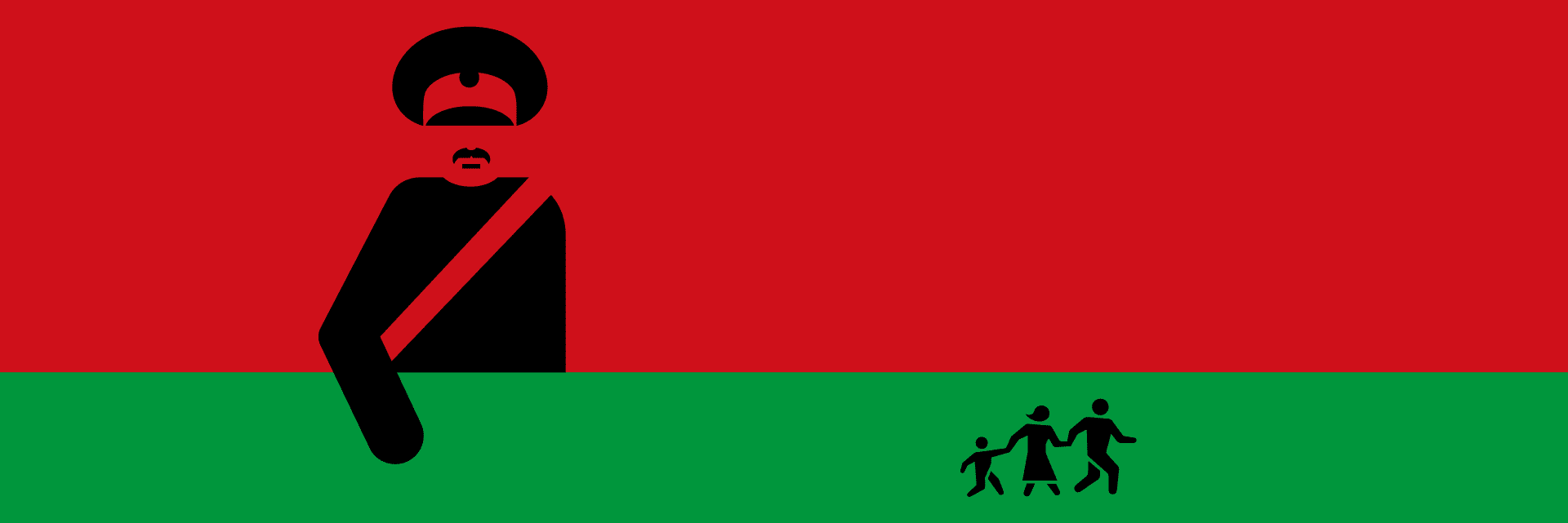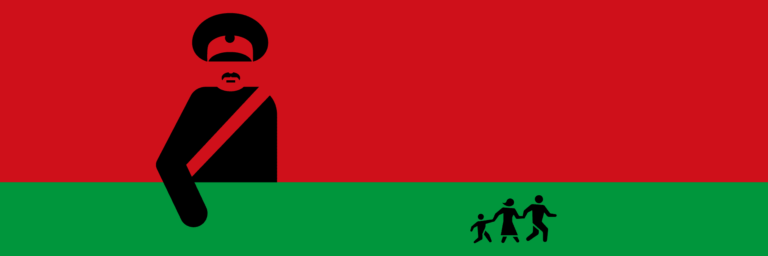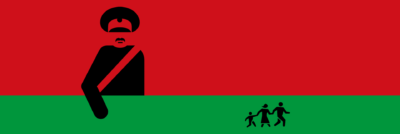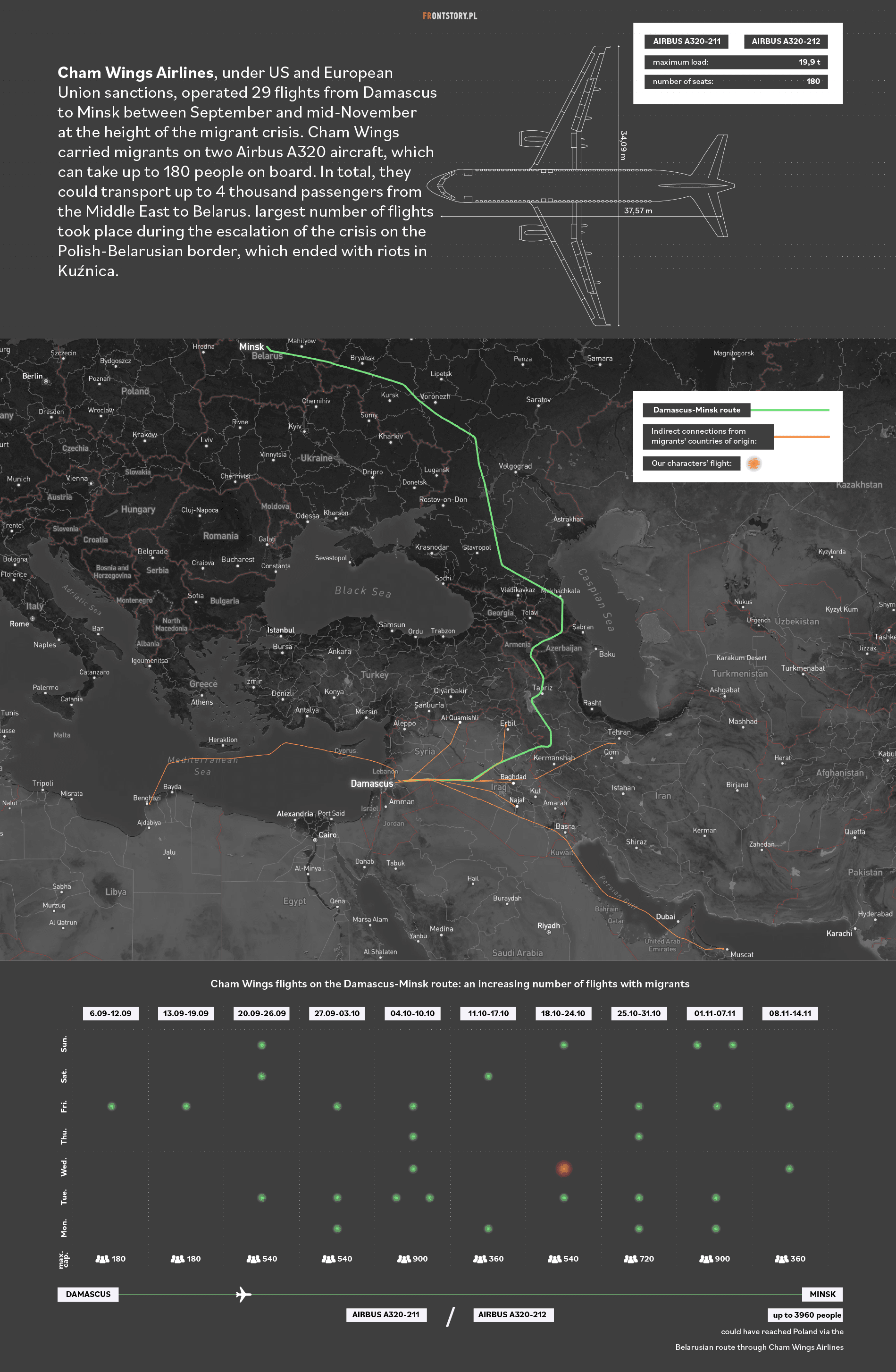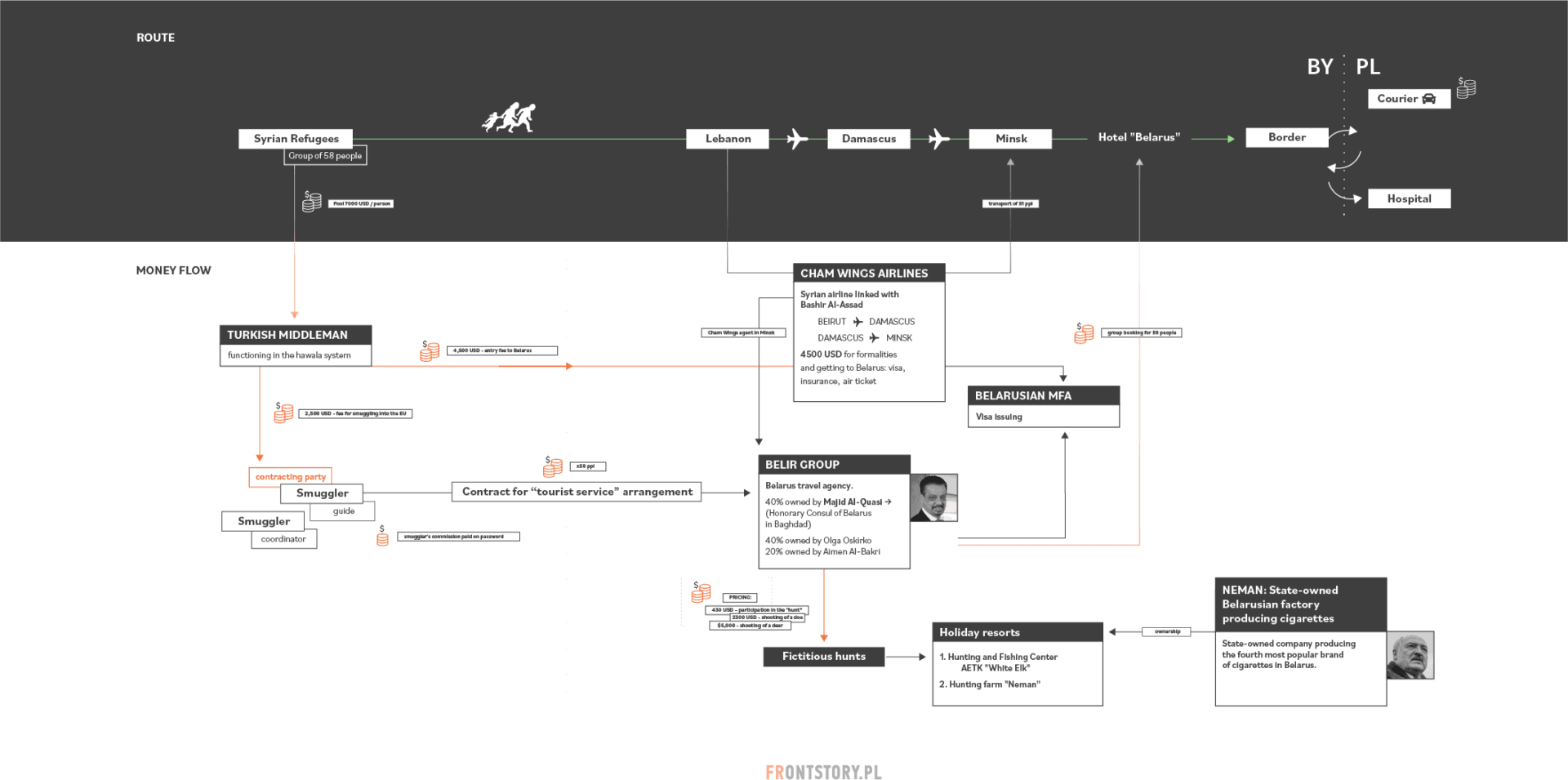by Julia Dauksza, Anastasiia Morozova (FRONTSTORY.PL), Paweł Reszka (Polityka)
Companies connected with the Alexander Lukashenko regime are profiting from smuggling migrants from the Middle East. We have come across one such firm. Journalists from FRONTSTORY.PL have uncovered illicit financial flows and identified the individuals behind this human trafficking scheme. We have secured direct evidence of connections between the Belarusian regime and the organizers smuggling migrants across the Polish border.
This article was originaly published on frontstory.pl
One of the key players profiting from smuggling migrants through Belarus is 60-year-old Majid Al-Qaysi – a man closely tied to the Belarusian government. This businessman, the honorary Belarusian consul in Baghdad and a vocal supporter of Lukashenko, is on friendly terms with Belarusian government ministers. Officially, Al-Qaysi is the co-owner and manager of a chain of travel agencies – firms offering trips to the Belarusian capital, museum tours, and hunting trips to Middle Easterners.
But lately, his business activities have become a front. Journalists from FRONTSTORY.PL have been able to confirm that the companies managed by Al-Qaysi are involved in bringing Middle Eastern migrants into Europe. His clients don’t see the sights in Minsk nor do they go on shopping sprees, visit the local aquapark, or hunt deers… Instead, the people Al-Qaysi flies in from the Middle East have paid serious amounts of money to be smuggled across borders. The official tours offered by Al-Qaysi’s companies serve as a cover for human smuggling rings. We followed the money flowing through this trafficking scheme, uncovering the ways in which cash is transferred from migrant’s pockets, through middlemen, to the bank accounts of state-owned Belarusian companies. We have also managed to track down and interview the victims of Al-Qaysi’s illicit dealings.
A find from the woods
This story starts in Poland, close to the border with Belarus. In the last days of October, a local naturalist found a set of documents lying on a wooded lane in the primaeval Białowieża Forest that spans the Polish-Belarusian border. The location is not accidental – this bundle of pages was found close to the road leading from Białowieża to Hajnówka, the only way inland from the three-kilometre-wide restricted military zone along the border.
Every day, this road is teeming with cars driven by those who smuggle refugees. Couriers arrange to pick migrants up in the woods, should they successfully manage to illegally cross the border, avoiding military and police patrols. The cars then drive them across Poland – all the way to Germany.
The Polish police are well aware of what is going on. They watch this particular stretch of road, so the migrants waiting for rides hide among the trees. They emerge when a signal is given and run towards the cars once they appear.
The documents found that particular day – 16 pages worth – were most likely discarded by a guide rushing a group of migrants from their hiding place once transport had arrived.
The person who found the documents handed them over to Grupa Granica, a team of volunteers helping migrants struggling in Polish forests. They then passed them on to our journalists from FRONTSTORY.PL.
Without a doubt, these documents are directly related to what is happening on the Polish-Belarusian border. Some pages are missing, but our analysis of the documents found them to be a record of the methods used to smuggle people from the Middle East into Europe.
They include the personal data of numerous people who used the services of a Belarusian company to get from Lebanon and Syria into the EU, as well as passenger lists from Syrian airlines, flight reservations from Beirut and Damascus to Minsk, and a list of hotel guests. They also include a contract signed between an Arab intermediary and a Belarusian agency offering 58 guests tourist facilities in Minsk.
If these documents are related to an ordinary holiday, why were they found on the Polish section of a route used by human smugglers? Where are the tourists who flew into Belarus from Beirut and Damascus? Were they really there to visit museums in Minsk or did they in fact pay someone to smuggle them into Europe?
What did we find out by following the trail of these 16 pages?
Experience the sights and sounds of a dictatorship…
Our research begins with the company that signed and stamped the documents – Belir Group, based in central Minsk. It is owned by Majid Al-Qaysi, the aforementioned honorary consul in Iraq and an entrepreneur. As the former, he represents Belarusian interests in Baghdad, while his business activities includes acting as an agent for Iraqi airlines flying to Belarus. Al-Qaysi has been residing for the past 22 years in Minsk, where his family owns several companies and properties.
The documents found in the Polish woods include a contract dated October 2021 between Belir Group and Bassel Kassem Al-Kweider, a 32-year-old Syrian national. According to the agreement, Belir Group is supposed to organize hunting trips for Al-Kweider and other foreign guests in Belarus. The first of these excursions was to take place close to the Biełyj Łos (White Moose) holiday resort and the second in a hunting lodge called Neman. Both belong to Grodno Tobacco Factory (GTF) Neman.
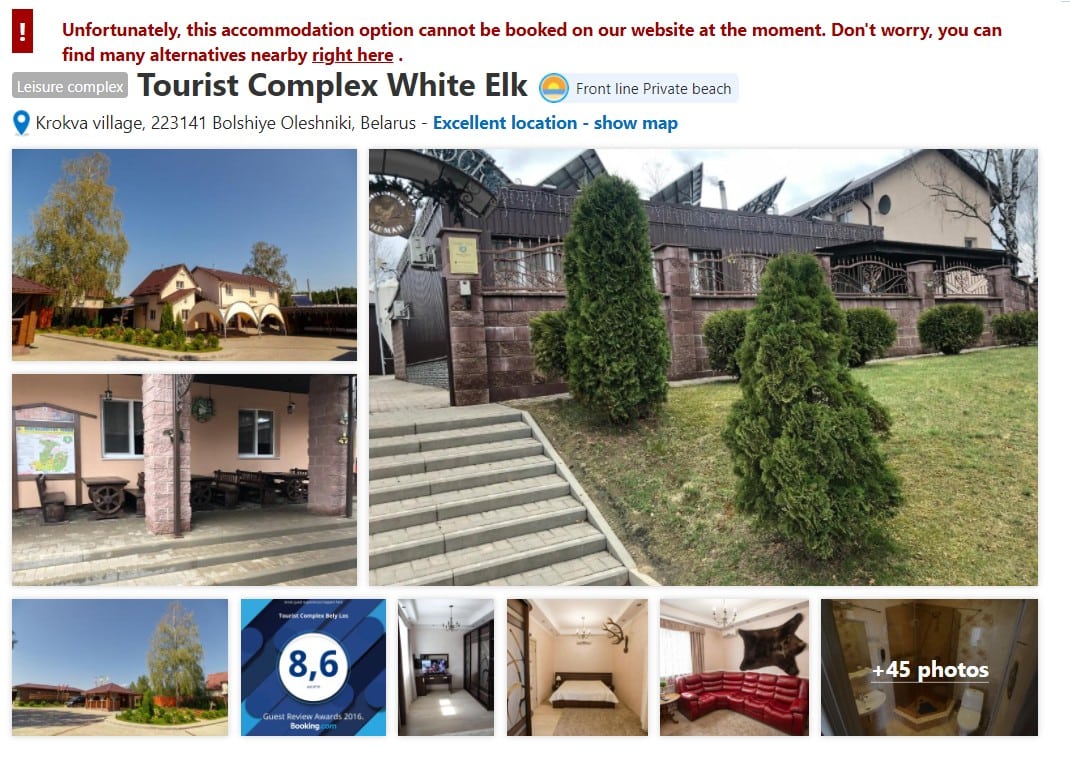
The White Elk resort’s listing on Booking.com. Source: Booking.com
Hunting on the GTF Neman estates? Sounds innocent. Yet, the company, the largest cigarette manufacturer in Belarus, has been slapped with sanctions by the USA, as it receives preferential treatment from Alexander Lukashenko. Its products are illegally distributed throughout Europe, and the profits then channelled back to benefit the Belarusian dictatorship. This set-up is overseen by Aleksei Oleksin, an oligarch trusted by the Lukashenko regime, who in 2018 gained exclusive rights to trade the products produced by GTF Neman. Reporters from OCCRP and Siena.lt found that soon after a spike in tobacco smuggling occurred.
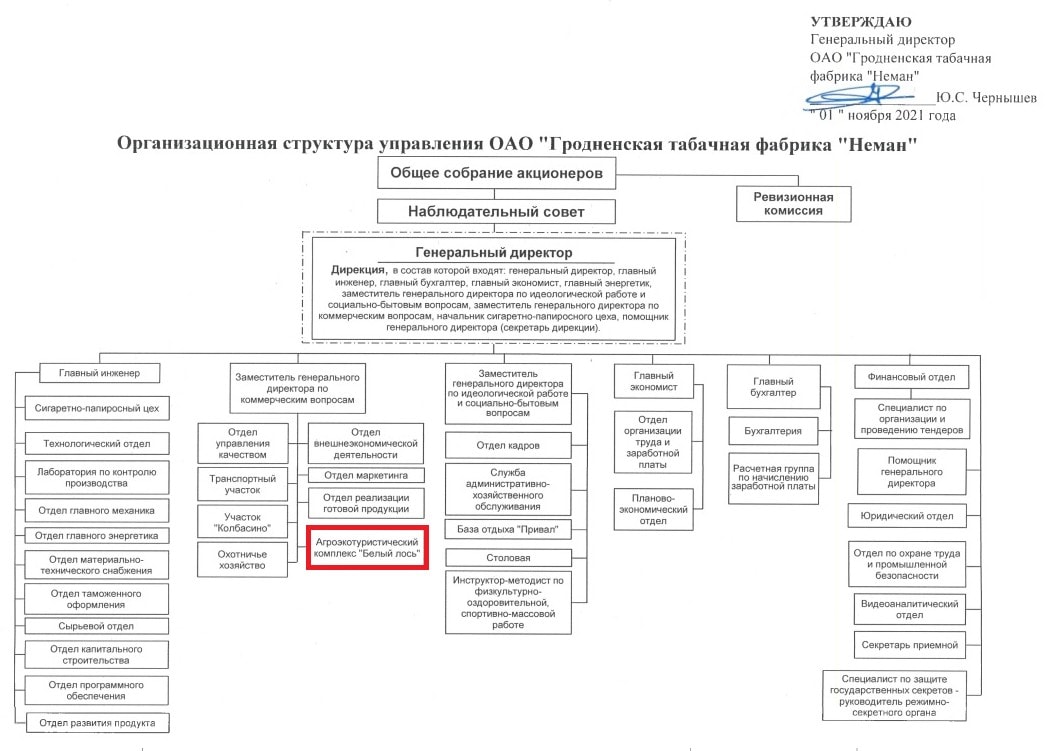
The structure of the Grodno Tobacco Factory Neman company. Source: http://www.tabak.by/
From Damascus to the Stalin Line
The recovered documents reveal that the cost of joining these Belir Group hunting parties is approximately 430 US dollars (1,100 Belarusian rubles) per person and that at least 58 people had to join each trip. Therefore, the Belir Group was making an estimated 25,000 US dollars on each trip.
The contract also includes trophy fees: shooting a female incurs a fee of 2,500 US dollars (6,100 Belarusian rubles), whereas taking a male costs 5,000 US dollars.
HUNTING PRICE LIST
Cost per person: 230.00 Belarusian rubles (approx. 90 US dollars)
Price includes:
- Trip around the Biały Łoś AETK (agro-eco-tourist resort) grounds + a visit to the trophy hall
- Use of shooting range
- Off-road vehicle trip to hunting lodge
- Dinner made out of prey hunted by guests (+ grilled pike)
- Serving of tea
Hunting expenses
| Name | Cost BYN |
| Hunting of the European fallow deer
(Horns with up to 5 points)Horns with more than 5 points |
6,100.00 Belarusian rubles
1,100.00 Belarusian rubles (for each horn point) |
| Deer – prime grown stag (Horns with up to 5 points)
Horns with more than 5 points |
12,700.00 Belarusian rubles
2,200.00 Belarusian rubles (for each horn point) |
| Young deer (up to one year old) | 900.00 Belarusian rubles |
| Deer – prime grown stag | 2,000.00 Belarusian rubles |
| Hunting animals in the paddock | 220.00 Belarusian rubles |
| Use of a rifle | 237.00 Belarusian rubles |
| Ammunition 30/06 | 23.00 Belarusian rubles |
This apparently innocuous price list is a key part of the contract.
This convenient payment formula gives credibility to any amount that the Belir Group transfers to the hosts of the “hunt”, as a fee for theoretical trophies.
Verifying if anyone shot anything, anywhere, is impossible – a handy way to transfer any sum of money via the Biełyj Łoś resort to its owner, the GTF Neman company.
The contract also reveals that a group of visitors from the Middle East was accommodated for a two-week-long bed-and-breakfast stay in Hotel Belarus in Minsk (from 18 October to 1 November 2021).
An itinerary found indicates that the visitors were to spend three days hunting. The remaining time was to be devoted to visiting attractions – such as the Stalin Line fortifications close to Minsk, the Belarusian National History and Culture Museum, and the Museum of the Great Patriotic War. The organizers also planned trips to an aqua-park and shopping sprees.We confirmed that this itinerary was completely fictional. Those taking part in this particular holiday trip were taken straight from Minsk and transported to the Belarusian Polish border.
A friend of the regime
The Belir Group was established in 2015; three years ago it was still headquartered at a prestigious office complex opposite the presidential palace.
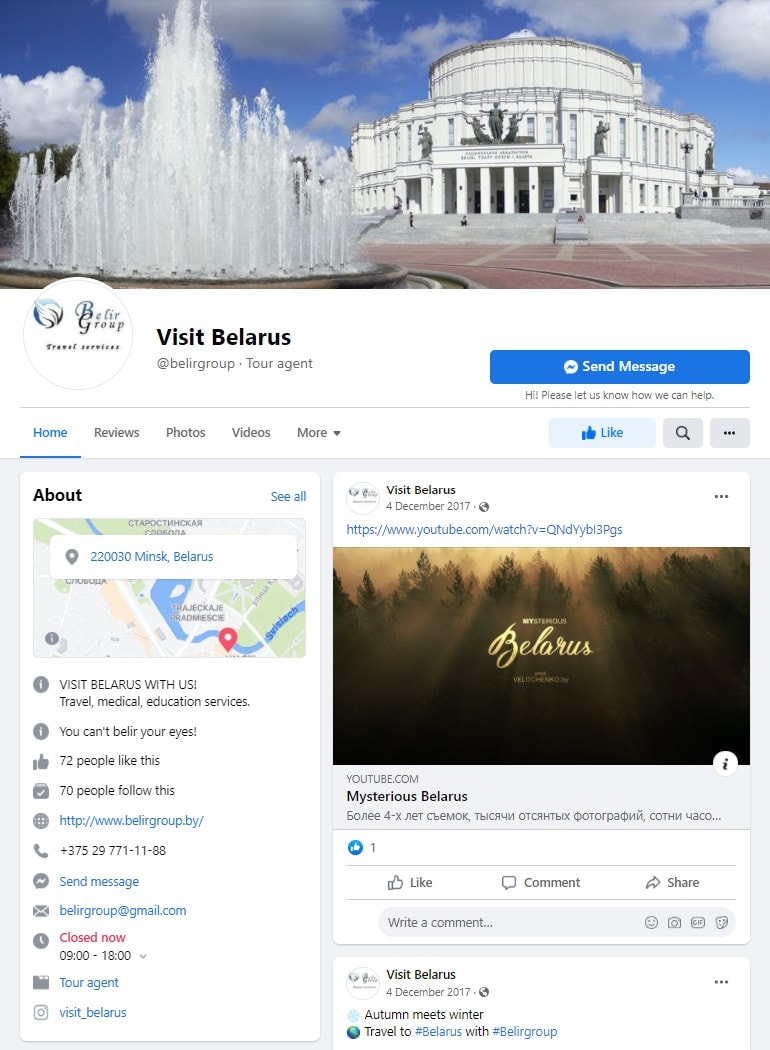
Visit Belarus page. Source: Facebook
Today, the Visit Belarus Facebook page and Instagram account managed by Belir are inactive. They contain posts informing potential clients about the services offered by Belir: planning holiday travel, facilitating medical tourism in Belarus, and arranging student visas.
The hunting trip contract was signed on behalf of Belir by its director, Olga Wiktorowna Oskirko, who not only heads the company, but also owns 40% of it. The remaining shares are owned by Aimen Al-Bakri and Majid Al-Qaysi.
Al-Qaysi is an Iraqi national who has been based in Minsk for years and maintains close contact with the Lukashenko regime. How close? His foremost role is representing the regime’s interests in Iraq. A few months ago, he appeared in Baghdad during talks between the Belarusian and Iraqi deputy ministers for foreign affairs as a member of the Belarusian delegation, and when the dean of the University of Baghdad visited Minsk, Al-Qaysi took him to the Ministry of Foreign Affairs and attended a meeting with the deputy minister.
Why does being the honorary consul in Iraq play such an important role in such negotiations? Belarus has no official representatives in Iraq; its interests are formally represented by the Belarusian ambassador to Turkey, who in 2020, while filing his diplomatic credentials in Baghdad, visited Al-Qaysi’s offices there. Belarus has a second honorary consul in Erbil, the capital of the autonomous region of Iraqi Kurdistan.
The activities of both these offices have caused alarm and controversy in light of the ongoing migrant crisis, mainly due to the “simplified visa procedures” introduced by Belarus this year to enable Iraqi migrants to enter the country “for tourist purposes”. On 6 November 2021, Belarus closed both consulates in response to demands made by the Iraqi Ministry of Foreign Affairs. According to an official statement made by the ministry and provided to the Iraqi News Agency, “this step comes to protect Iraqi citizens from human smuggling networks through Russia and Poland.”
❗️SICAK GELİŞME
Irak Dışişleri Bakanlığı’nın Belarus Konsolosluğunu kapatma kararının ardından Hewler’deki Belasur Fahri Konsolosluğu önünde bulunan Belarus Bayrağı indirildi!
Belarus-Polonya sınırında yüzlerce Kürt göçmenin bekleyişi ise devam ediyor! pic.twitter.com/IFenqXIkTo
— Rojnews Türkçe (@RojnewsTR) November 6, 2021
“Following the decision of the Iraqi Ministry of Foreign Affairs to shut down the Belarusian Consulate, the Flag of Belarus was lowered in front of the Honorary Consulate in Irbil! Hundreds of Kurdish immigrants continue to wait on the Belarus-Poland border.”
All of the above shows how the owner of the Belir Group, responsible for these reputed hunting trips, is closely allied with the Belarusian Ministry of Foreign Affairs. What’s more, Iraqi authorities have linked his activities to human smuggling networks. We contacted the Iraqi Ministry of Foreign Affairs for a comment regarding the closures of these consulate offices, but we have not yet received a reply.
Mr Majid wears many hats
Belarusia’s honorary consul is a colourful character, keen to appear in the public eye and discuss the migrant crisis ever since it began.
Minsk Airport, June of this year. Several journalists are working on reports about migrants from the Middle East making their way directly from the airport to the border with Poland and the EU. They are approached by Al-Qaysi, who introduces himself as the honorary consul of Belarus in Baghdad, but on camera he presents himself as a representative of Fly Baghdad airlines and claims: “We, Fly Baghdad, did not let a single Kurd in. I work as a filter. I do not allow them in because I know they are illegals. We do not invite Kurds.”
This extra bit of information means Al-Qaysi wears several different hats as
- the Belarus consul in Baghdad, where his activities were finally curtailed by the Iraqi Ministry of Foreign Affairs, with no specific reasons given;
- the owner of a travel agency in Minsk, which at the peak of the migration crisis organized “hunting holidays” for tourists from the Middle East; and
- an official representative of airlines flying from the Middle East to Eastern Europe.
Al-Qaysi also supports the Belarusian regime’s propaganda activities (state-owned media outlets present the border crisis as a clash between unfortunate refugees and ruthless European Union officials). For example, when a young Iraqi national died on the Lithuanian–Belarusian border in August 2021, the Belarusian authorities staged a sham investigation, issuing orders for the victim’s family to be found. The next day, the deceased man’s family was already in Minsk, met at the airport by none other than Al-Qaysi.
Al-Qaysi is a fierce ally of the Lukashenko regime; in August 2020, when OMON police units brutally suppressed opposition demonstrations in Belarus, he was interviewed by STV, a propaganda-spewing television station.
What more could people want?
In his TV interview, Al-Qaysi praised Belarus for being a peaceful country filled with good-willed people, singling Alexander Lukashenko out for personal praise: “I very much respect the president. I am sorry we do not have someone like him back home [in Iraq]. I know that when I go to sleep no one is going to steal my home in the night. What more could people want?”
When it comes to homes and real estate, Al-Qaysi is a real expert; the consul and those close to him own several properties in Belarus, as we have established with the help of the Right Point initiative. Al-Qaysi and Olga Oskirko (co-owner and director of the Belir Group) are not just partners in business but also in life – they both shared a single home in Minsk for years, while Oskirko represents their underage son in his dealings on the property market.
The consul’s son was only four years old when he became the owner of a plot of land and a residential home in the suburbs of Minsk. Oskirko herself is the owner of a villa on the outskirts of the capital. Al-Qaysi owns two large apartments and shares in several companies based in the Belarusian capital. His companies are run by a complex network of shareholders and supervisors related to Al-Qaysi and his partner, Olga Oskirko. Apart from owning the Belir Group, Al-Qaysi has shares in the Ekstratur travel agency (partly owned by Oskirko) and in a firm called Geit Inwest.
Planes keep flying, refugees keep trying
We return to the airport in Minsk, the one where Al-Qaysi claimed to be an agent of the Fly Baghdad airline – our research confirms he is the airline’s main agent in Belarus. This has been true since May 2021, when the first flights to Minsk were being celebrated in the presence of Belarusian officials. The very same month refugees from the Middle East began to appear on the eastern borders of the European Union.
Three months later, the Iraqi government suspended all scheduled flights to the Belarusian capital – but not before Al-Qaysi’s airline managed to arrange 22 return Baghdad–Minsk flights, each able to carry almost 200 passengers. Iraqi Airways (Al-Qaysi represented this airline in Minsk and Moscow before fronting Fly Baghdad) was flying at least 40 flights along the same route at this time, which is when, between May and August, at least 4,000 people appeared on the Belarusian–Lithuanian border.
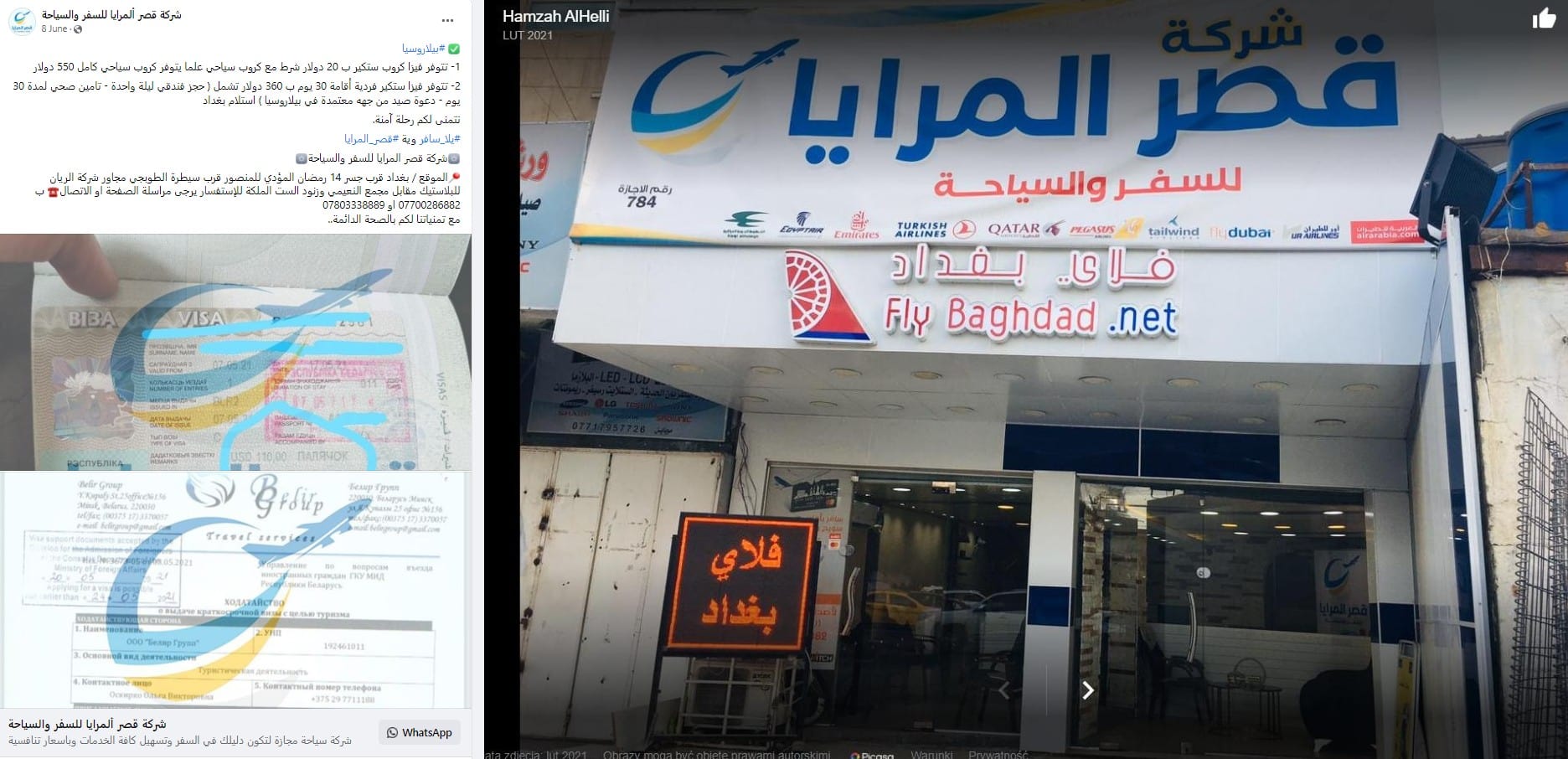
On the websites of Iraqi tourist offices, we find further evidence that the Belir Group brokered the issuing of Belarusian visas to Iraqi citizens.
The consul and covert lines
We have no evidence proving that all Fly Baghdad and Iraqi Airways passengers were planning to seek asylum in the EU. Yet, many would-be migrants took advantage of the flights these airlines offered.
Al-Qaysi’s company, Belir Group, is also a Cham Wings’ agent in Minsk.
Cham Wings has a fleet of just three aircraft. Its owners are directly connected with the Syrian president, Bashir Al-Assad. Five years ago, this airline was subjected to sanctions by the USA for transporting illegal arms. According to the Reuters agency, it also chartered flights transporting Russian mercenaries employed by the Wagner Group to Syria.
Cham Wings would then accept group flight reservations made by refugee smugglers in 2021. And – as the documents found in the woods on the Polish border show – Cham Wings flew a group of passengers from Beirut for hunting trips staged by Belir Group.
As of September 2021, Cham Wings had flown at least 29 times from Damascus to Minsk, with most flights taking place just before the crisis on the Belarusian EU border deepened, culminating in disturbances at the crossing in Kuźnica.
On 13 November – the day after Al-Qaysi was suspended as the honorary consul in Iraq – Cham Wings ceased operations in Minsk.
The journey leading to hospital
We now know that the Belir Group did not accidentally become involved in transporting migrants from the Middle East. As we have described above, its co-owner, Al-Qaysi, a major supporter of the Lukashenko regime and its official representative in Iraq, has close ties to Fly Baghdad and Cham Wings, the airlines bringing asylum seekers to Belarus.
The documents found in the woods along the Polish border include the list of passengers on a Cham Wings flight from Beirut to Damascus in October 2021. The list includes 51 people with Arabic names. These documents also include a list of how guests were accommodated in the hotel in Minsk – it contained the same 51 surnames and seven additional ones, making a theoretical total of 58 people – the same number attending the fictional hunt organized by Al-Qaysi.
The papers found in the woods are not a complete set of documents, and the routes taken by the migrants are not clearly laid out. What flight route did they take from Beirut? How did they reach Minsk? What happened then? How did these documents end up being accidentally dropped so close to the Belarusian—Polish border? They were found just at a time when the people mentioned in them were supposed to be following a tour guide around the Belarusian National History Museum and the National Museum of Art.
We asked humanitarian organizations to help us find some of those named on the passenger list. This allowed us to contact Raed Yaser Srour, one of the participants of this reputed tourist visit. At the end of October 2021, this 37-year-old from Syria ended up in a hospital in Hajnówka, suffering from exhaustion and dog-bite wounds.
Who sets dogs on people?
Raed confirmed to us that his name appears on the list of passengers and guests set to stay in the hotel in Minsk – and that from the very start of the journey to Belarus there was no talk of tourism: “I paid an agent to get me to Belarus and then through Poland to Western Europe,” Raed admits, describing how he was injured during the border crossing.
His testimony is supported by medical reports produced by the hospital and information sourced from the Polish Border Guard. Raed’s medical record shows he was admitted for surgery on 29 October 2021 due to “numerous infected bite wounds in the scalp area of the head ”, or in other words, dog bites.
The Foreigner Registration Centre in Połowce, run by the Border Guard, produced the following report: “It has been established that a foreign person was spotted on 29 October 2021 some 900 metres from the national border […]. This foreign person crossed state lines, in breach of the law, close to border post number 274, from the Republic of Belarus into Poland, at a place which is forbidden without documents authorizing him to cross the border […]. Due to his deteriorating health and open wounds, sustained while climbing over border fencing, he was transported to a medical clinic in Hajnówka.”
These notes describe his injuries as having been caused by “ climbing over border fencing”, but hospital reports clearly state Raed’s injuries were caused by dog bites. Why the discrepancy?
Nomads from Beirut
Raed left hospital on 3 November 2021 and found shelter in a semi-secure refugee centre run by a non-governmental organization in Białystok. We managed to meet and speak with him. In fact, we conducted two interviews – one face to face and one through an Arabic interpreter over the phone.
Raed Srour told us the following: “I come from Dara, which is where the insurrection against Assad started. I am apolitical, but considering where I was born, I was arrested in 2016 and detained for a month. I was beaten and tortured. Anyone who comes from Dara is a suspect to the Assad authorities. Once I was released, I travelled to Beirut. I worked illegally, living with a family in a shack set close to a factory. In 2021, I decided to migrate to Europe.”
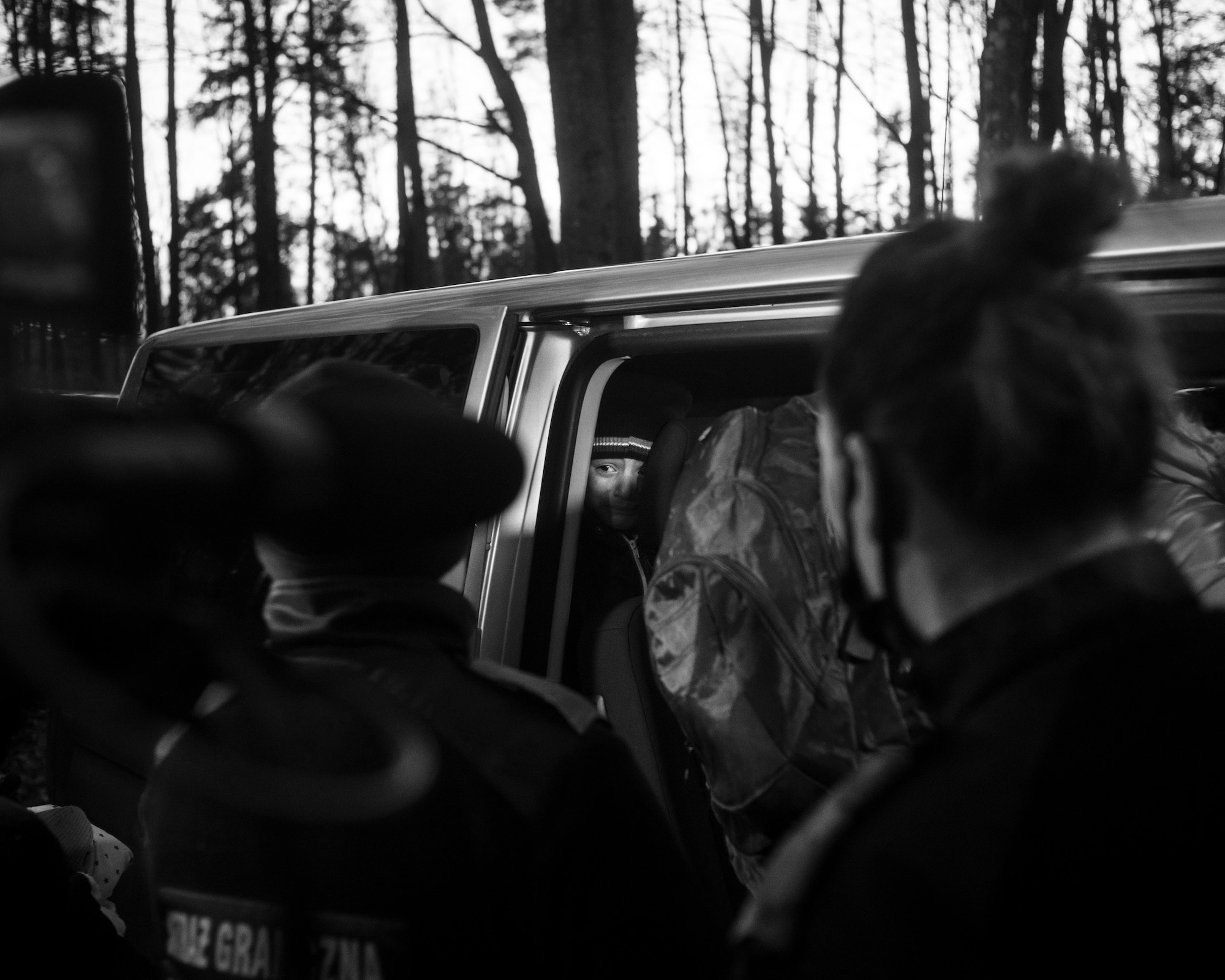
On the Belarusian-Polish border. Source: Karol Grygoruk / RATS Agency
In Lebanon, a country suffering a dreadful humanitarian and economic crisis, 20% of the population are refugees from Syria, many of whom are more than willing to board flights to Europe. Getting rid of people by having smugglers take them to Europe is also in the interests of the Lebanese government, which shoulders the burden of having to look after the refugee population. Leaving Lebanon often means no way back, because the refugees’ passports are stamped with one-way visas.
The hawala style system of corruption
Raed tells us he contacted a smuggler on WhatsApp. The smuggler was a Kurd by the name of Abu Jahia. Raed never met him face to face, yet paid him 4,500 US dollars for safe passage to Minsk, plus another 2,500 dollars to get from Minsk to Europe. The money was to be paid to a Turkish travel agency.
This agency is likely to be what is called a hawala office, where migrants pay travel costs, which include a deposit for the smuggler that is paid out once the office receives confirmation that a migrant has reached their destination. In this fashion, the smugglers only receive their provision once they succeed in their mission, while the hawala office receives their commission for taking part in the transaction. Such a scheme was revealed by Polish journalists from Superwizjer TVN.
Still, most of the profits from the whole operation end up elsewhere.
But first, let’s return to Raed’s story: “We flew out on 20 October 2021 on a Cham Wings plane from Beirut to Minsk, where an Arab was waiting for us as prearranged by the smugglers. He took a group of 20–25 people, including women and children, to Hotel Minsk or Belarus. [Raed was unsure of the actual name, though documents indicate it was Hotel Belarus.] We spent one night in this hotel, and on 21 October we were ordered to gather outside the hotel. Two cars driven by Belarusian drivers awaited us. Eight of us set off for a journey of four to five hours. We got out in a forest. The drivers showed us that we were to walk on ahead. Abu Jahia guided us over the phone. We reached the border, at a place where the fencing had been cut open. A car was supposed to be waiting for us on the other side of the border, but we couldn’t find it. Abu Jahia kept giving us instructions over the phone, but we wandered around for three days. Eventually, we reached a main road.”
An officer armed with a baton
It was at this road that a jeep should have been waiting for the refugees, but Raed’s group did not get to it. First, they were stopped by the Polish police. More police cars and vans arrived: “A police officer got out and started hitting us with a stick. Everyone was beaten, except for two of the women. Our suitcases and phones were confiscated. The whole group was then taken by van to the border and thrown out into no-man’s land [most likely they were shoved through fencing into Belarus territory]. Only our phones were returned to us. We went back to Belarus, walking for several hours. Then we met up with a group of about 40–50 people and were told to once again try crossing the border at a spot chosen by Belarusians. Once more, we encountered the Polish Border Guard – dogs, horses, drones. All in all, I tried to get across three times.”
During the third attempt – close to border marker no. 274, in the woods between Czeremcha and Puszcza Białowieska – Raed managed to cross the border and run for almost a kilometre before being caught by the border guards. He got tangled up and fell: “As I was lying there, a dog began mauling my head. It belonged to the Polish Border Guard or the police. Masked officers, armed with guns, set dogs on us. Another one of our party was also badly bitten. His arm was severely mauled.”
Number 24 tells his story
Raed lost consciousness. He came to the hospital, having lost his phone and the rest of his companions.
We managed to track down the whereabouts of the family of another refugee who ended up in hospital alongside Raed – his cousin Saleh, another passenger listed in the documents found in the woods.
From messages sent by a German translator who, upon requests from Saleh’s family, kept looking for his family in Poland, we discovered that after his wounds were dressed, Saleh was taken by force back to the border. An email sent by the translator to an aid agency reveals the whereabouts of five more members of Raed’s travelling party:
“A Syrian woman living in B. [a city in Germany–Ed.], told me […] that her brother and his 6-year-old child are stuck between the Belarusian and the Polish borders. They are neither allowed to return to Belarus, nor can they move on to Poland. […] Today the small group was picked up at the border by Polish security forces, and the brother, and the cousin of the Syrian woman [Raed–Ed.], were injured by dogs so that they had to be taken to a Polish hospital.
The brother has been picked up by the Polish police and taken back to the forest. Her cousin [Raed–Ed.] is still in hospital with head injuries. Now, however, the two men have lost contact with the wives and children travelling with them. The women have no mobile phones and were left traumatized in the forest after the attack by the Polish police.”
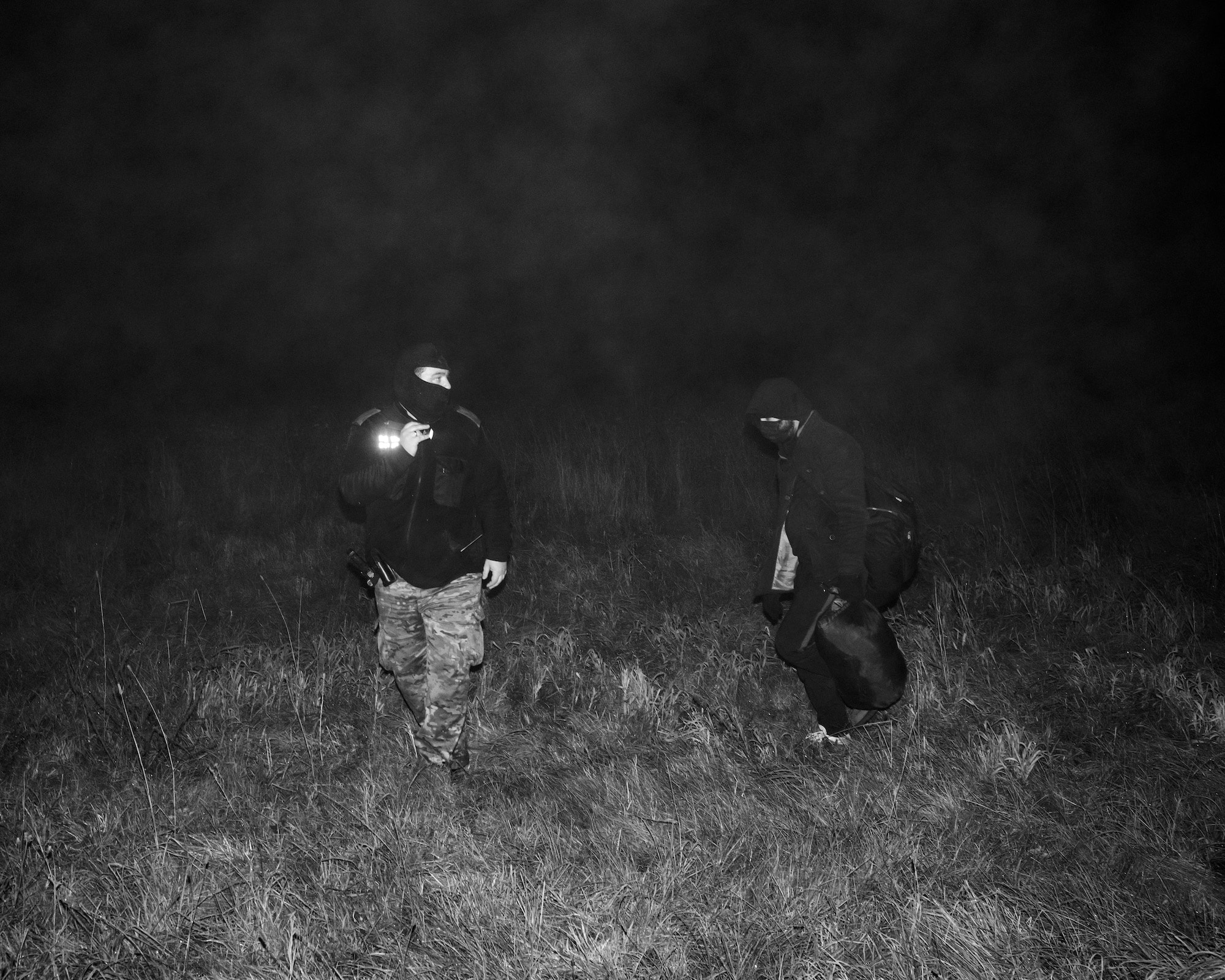
On the Belarusian-Polish border. Source: Karol Grygoruk / RATS Agency
Most members of this group, despite these dramatic events, reached Germany in November. Raed ended up in hospital due to the severity of his injuries. A relative from Germany provided him with a phone.
He continues his story: “I was taken out of the hospital by border guards. Locked in a room for ten or more hours. Stripped naked. Searched in demeaning ways. I was then put in a hangar with a group of Kurds. We had no interpreters. The staff could not get through to the detainees. Everyone was given a number – mine was 24. I was finally interrogated through an interpreter, and my fingerprints were taken. I was told to confirm I have been bitten by stray dogs, but I refused.”
Hunting? Yes, but you will be the game
A few days after we conducted this interview, Raed made his own arrangements to leave Poland and head further West.
The sum of 7,000 US dollars he paid the Turkish hawala agents to cover the complete cost of his journey to Europe is close to the price listed for shooting a European fallow deer and a young buck deer in the documents found in the forests of Bialowieża. At the time he was supposed to be enjoying his hunting holiday at Biełyj Łoś and the Neman hunting lodge he was instead hounded by border guards and pushed through a barbed wire fence by Poles across to the Belarusians, a hunt which ended with him being admitted to hospital.
If each one of the 58 people listed as having flown over for the hunt organised by the Belir Group paid the equivalent of killing a European fallow deer and a buck, as shown in the documents found close to the Polish border, the overall income for the event organisers would exceed 400,000 US dollars.
The 7,000 dollar price tag covers the visa fee, the smuggler provision split between Abu Jahja and the guides on the border, the cash handling fee for the hawala office, flights on a Cham Wings plane, the stay at Hotel Belarus,transport to the border, and the car on the Polish side of the border. The remaining profit is divided between the Belir Group and the state-owned Biełyj Łoś resort.
Majid says: migrants, go home
Raed’s story and the fate suffered by other travellers from the Middle East are dramatic. We asked the Polish Border Guard to comment on whether dogs were used to attack refugees. “The Border Guard is authorized to comment on individual cases only in response to information requests from authorized bodies and parties involved in legal proceedings. The Border Guard has dogs at its disposal to use for the protection of national borders,” replied the Polish Border Guard’s spokesperson.
We are unable to verify the details of Raed’s story about his encounter with Polish border officials. But thanks to the documents, we know that the trips the Belir Group offered were fronts for smuggling migrants to the West. The company was paid vast sums of money to facilitate illegal border crossings. None of those who paid for trips were there to visit Minsk, go shopping, swim at an aqua-park, or hunt for deers. Migrants paid smugglers in cash to arrange illegal border crossings.
One of those who profited from this business is Majid Al-Qaysi – businessman, honorary consul of Belarus in Baghdad, vocal supporter of the Lukashenko regime, and friend to many government ministers. We wanted to discuss our findings with the owners of Belir Group, but they did not respond to our requests for meetings or comments. We sent a list of questions to Olga Oskirko. Why were people brought over for hunting holidays and trips around Belarusthen found severely injured on the Polish side of the border. Is the company she runs with Majid Al-Qaysi involved in smuggling people from the Middle East? Why were documents belonging to their companies found in the Polish woods? Was this smuggling ring authorized and facilitated by Belarusian authorities?
No answers have thus far been provided.
At the end of November, Majid Al-Qaysi appeared in public speaking on the Kurdish NRT TV news channel, he appealed to refugees from Kurdistan to leave Belarus, emphasizing that the country was unable to feed those trapped at the border.
VICTIMS OF THE BELIR GROUP
On 28 October, in the Białowieża Forest close to the Polish border with Belarus, authorities find Shiyar, a 37-year-old Syrian national who was abandoned by his group in the woods once he was unable to walk on with them. He hadn’t eaten or drunk anything for several days.
Shiyar is one of many victims who have been preyed upon by the Belir Group. He too paid to take part in the fictional hunting trips organized for groups of 58 visitors from the Middle East. He had taken care of all the formalities in Beirut. The intermediary, in this case, was the Cham Wings company advertising its services on Facebook; 4,000 US dollars was enough to secure visas, a stay at Hotel Belarus, tickets, and travel insurance. He left his passport and two photos at Cham Wings offices. His visa arrived 10 days later.
On 20 October 2021 he flew from Beirut to Minsk. His group was picked up by bus in the Belarusian capital, and some 40 passengers were taken to the hotel. There was no talk of any hunting or sightseeing trips.
Shiyar planned to get into Western Europe, having deposited the 2,500 US dollars needed to cover the costs of the journey at an office in Istanbul. A secret password would be provided to release the funds to the smugglers once he successfully reaches destination.
On 24 October 2021, his group left hotel (12 people in three cars). Their “coordinator”, working via WhatsApp, was a smuggler by the name of Abu Hur. They drove for 4–5 hours in the direction of Brest. The drivers collected a fee of 100 US dollars from each traveller and ordered them to walk towards the border. Abu Hur sent them the GPS coordinates.
Trapped and despairing in the woods, Shiyar decided to withdraw the funds deposited in Istanbul, via a friend. This was when the rest of the group abandoned him, while he tried to press on with another refugee he met along the way. They tried to breach the border fencing. Eventually, Belarusians showed them a spot where they could force their way through the fence. Once over the border, they wandered around, lost on the Polish side. Trapped in marshlands, Shiyar ran out of strength, convinced he was about to die. He was rescued by local residents who put him on a stretcher and carried him to an ambulance, which took him to a hospital in Hajnówka. There he met Raed and eventually made his way to the West.
His companions, having abandoned Shiyar once he had decided to recover his money for being smuggled across, walked on. It is likely they reached the pre-arranged pick-up point, and it was there that the smuggler guiding them to Narewka dropped the documents as he was running for the transport.
Which is how this whole story started.
Julia Dauksza, Anastasiia Morozova (FRONTSTORY.PL), Paweł Reszka (Polityka)
Support independent investigative journalism
in Poland, you can donate here.
Polish investigative outlet created by Reporters' Foundation.

